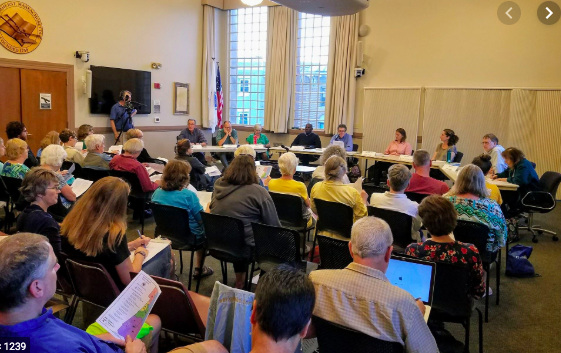Opinion: The Council at One Year – REFLECTIONS OF A CHARTER COMMISSIONER.

Public hearing of the Amherst Charter Commission in 2017. Photo: amherstma.gov

It’s inevitable that many would take the one-year anniversary of Amherst’s new government, coinciding with the start of a new calendar year, to look back and assess how things have gone. And it’s predictable that some would interpret events in order to reinforce previously held positions: for or against the new Town Council, or for or against the new Districts, or for or against an executive branch with one individual (Town Manager), rather than an executive branch with a 5-person body (Select Board) working in partnership with a high-level manager.
The continuation of Amherst’s polarization, seems to me the biggest threat to the success of our new government. I am committed to trying to tone that down, starting with myself, as someone who has held strong and controversial positions in the past. It’s not so easy, I’m discovering, largely because the polarization is rooted in opposing values and priorities: participation vs. efficiency; representation and accountability through lots of elected representatives vs. representation and accountability through a small number of more visible representatives; maximum transparency vs. ‘let’s get this done.’ As I reflect on the past year, I will endeavor to reflect on the accomplishments and shortcomings of our new government, based largely on my own experiences.
There’s no need to linger on the points that have already been made about the new Council’s meetings and process which are so tedious and long that they are nearly impossible to follow. As should have been expected, most of the past year has been spent setting things up rather than making new policy. With a body of 13, it doesn’t work for everyone to say everything. These points have been made.
But let me offer some more detailed observations. The council committees are intended to carry out some of the work of the Council, through conducting research, by considering different perspectives, and by addressing controversies, all in order to bring well-thought recommendations to the entire Council. It seems to me that the Council often feels compelled to re-litigate the debates of the committees, largely because councilors don’t agree with the recommendations. This is a gargantuan waste of the councilors’ time and a major contributor to council inefficiency.
I favor reducing the number of committees or narrowing their mandate. Asking the Council to build a culture of accepting committee recommendations without much discussion seems unlikely to succeed in Amherst. Perhaps it’s time to reconsider the proposal for a Council Advisory Committee to carry out research on proposals that the Council is considering, as Michael Greenebaum and I have discussed in past articles in The Indy (look here and here).
Some on the Council seem unclear that the new Council is the legislative branch of our government, and doesn’t function like the Select Board did. Some seem to think they are the executive branch, and are eager to pre-empt regulatory bodies like the Planning Board. There is confusion about how to handle major endeavors like 40R zoning and the Master Plan, which is in the jurisdiction of the Planning Board.
Some councilors, not all, seem to want to oversee and approve much of what the Town Manager does, seemingly not understanding that the Town Manager in the new government is much stronger than the Town Manager was under select board/town meeting. This is what the majority of the Charter Commission wanted, hoping for more efficiency and a Town Manager who functions much like the CEO of a business by being held accountable through annual evaluations.
A good goal for the Council in its second year would be to develop and implement a more explicit understanding of how to be an effective legislative body, understanding where their authority ends and other bodies begin and what procedures to put in place to make that happen.
Amherst’s new government is extremely fortunate to have Lynn Griesemer as the President. She has proven to be an even-handed, patient, decisive and generous. She has created a strong sense of the team, and is largely responsible for the high level of mutual respect and civility amongst the councilors. While I certainly don’t agree with her on everything, she has created a culture where people can disagree with respect. Amherst needs more of that.
Amherst is also fortunate to have a Town Manager as skilled and experienced as Paul Bockelman. He has led the cumbersome and complicated process of managing the town with intelligence, patience and good humor. He takes every opportunity to appreciate his staff, many members of which are new and learning the ropes. We are also fortunate to have a remarkably strong and resilient staff, managing the myriad requests from the many Town committees and boards, with grace and efficiency.
One of the most impressive and important achievements of the last year is the creation of the Energy and Climate Action Committee, building on the Zero Net Energy Bylaw passed by Town Meeting in 2017. Darcy Dumont’s leadership has been spectacular and confirms how much one individual can accomplish with focus and determination. I have to add that it appears that some are eager to weaken the bylaw, arguing that Amherst can’t afford it. I think the opposite, that Amherst should be leading the way on the environment and can be a model to other communities.
I never bought the argument that reducing the size of the legislative body, from 248 Town Meeting members to 13 councilors, makes our government more accountable. I have discovered a stunning number of generally well-informed Amherst voters who don’t know which district they’re in or who their district councilors are. The number of people who know how their Council members are voting and participating is miniscule. Because the Council meetings are so long and tedious, even those who are trying to pay attention have a hard time tracking. Virtually no one is following the many committee meetings where a lot of the action takes place. Most people don’t know what the committees are, let alone what each one does.
One solution for helping residents track town events more carefully is the creation of district associations that help residents identify and follow matters that affect them. Districts 1 and 5 have strong neighborhood associations that have proven useful in helping residents learn where decisions are made and how to bring their concerns to Town officials effectively. The danger of politics through districts is that people become more focused on their specific parts of Town and less able to think about the Town as a whole.
Finally, it is a worry that the current councilors might not run for reelection because the job has been so onerous. It will be a huge failure of our new government if we do not have a large field of candidates in Council elections in November 2021.
